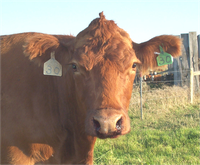Protect Livestock Against Anthrax
(Click the image below to view a high-resolution image that can be downloaded)
North Dakota’s second confirmed case of anthrax this year emphasizes the need to get livestock vaccinated against the disease, North Dakota State University Extension Service veterinarian Charlie Stoltenow says.
Vaccination is especially important for livestock in areas with a history of anthrax, he adds.
The latest case, confirmed this week, was a beef bull from northwestern Dickey County. The disease has been reported there in the past, according to Susan Keller, state veterinarian.
In May, an animal died from anthrax in Sioux County. It was the first confirmed case in that area in several years, Keller says.
Anthrax vaccine is effective and readily available, but it takes about a week to establish immunity, and it must be administered annually because the immunity appears to wane after about six months, Stoltenow says.
He recommends producers check with their veterinarian to make sure their livestock’s vaccination is up to date.
Although anthrax has been reported mainly in northeastern, southeastern and south-central North Dakota, Keller suspects cases have occurred in almost every part of the state. The state usually has a few confirmed cases every year, but in 2005, the disease killed an estimated 1,000 head of cattle, bison, horses, sheep, llamas and farmed deer and elk.
For more information about anthrax, visit http://www.ndsu.edu/cattledocs.
NDSU Agriculture Communication
| Source: | Charlie Stoltenow, (701) 231-7522, charles.stoltenow@ndsu.edu |
|---|---|
| Editor: | Ellen Crawford, (701) 231-5391, ellen.crawford@ndsu.edu |


